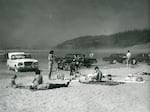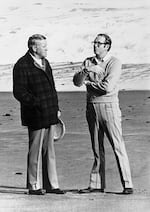
Cars and bathers on an Oregon Beach
Oregon State Archives
In the age of COVID-19, a socially-distance day on the Oregon coast may be one of the few ways to celebrate the Fourth of July this year. The majority of the state's scenic beaches are still open this holiday weekend, though some are open at different capacities. Normally, Oregon's beaches are accessible to the public at all times. The reason why is, unlike California and Washington, all of Oregon's coast is publicly owned. And we have one person to thank for that: Gov. Tom McCall. McCall has been called the most influential governor in Oregon's history. Looking back on the eight years he served as the state's chief executive, from 1967 to 1975, it's easy to see why. A quick Google search turns up a lot of legislation he signed that helped cement Oregon as one of the nation's most forward thinking states when it came to public access to beaches and the environment.
“It’s been almost half a century since [McCall] left office and Oregonians still remember him, admire him and believe he is kind of the quintessential Oregon leader,” said Kerry Tymchuk, executive director of the Oregon Historical Society
One could spend days reading about McCall's legacy — or just spend an hour revisiting this Oregon Experience documentary — but let's just look at what most Oregonians consider to be his most iconic legacy: the Beach Bill.
As was the case for a lot of McCall’s other actions as governor, the groundwork for the Beach Bill was laid way before he took office.
It was Gov. Oswald West who spearheaded the effort to make Oregon’s beaches public. In 1913, West declared Oregon’s coast a public highway, making the state’s beaches accessible to everyone.
Everything was fine and dandy for more than half a century. But in 1966, an opportunistic Cannon Beach hotelier cordoned off a portion of the dry sand behind his establishment, saying that part of the beach was private and for hotel guests only. And he wasn’t wrong. West’s public highway declaration only applied to the wet sand portion of the beach.
This did not sit well with many beach-loving Oregon residents, who were worried the state’s coast would become commercialized. Lawmakers introduced a pair of bills in 1967 designed to keep beaches public, but the legislation died in committee.
The matter didn’t gain much traction again until McCall took matters into his own hands, according to Tymchuk.
McCall did that by using
his background as a broadcast journalist
, naturally. He staged what would be equated to a media stunt today.

Gov. Tom McCall (left) and State Treasurer Bob Straub, pictured at an undisclosed location on the Oregon Coast in this undated photo, were leading figures in the effort to protect Oregon's beaches.
Oregon State Archives
“He commandeered two helicopters, made sure the media was there, made a couple of stops on the coast, including right outside the hotel, and got his point across that the beaches were for the people,” Tymchuk said. “The media ate it up, and that really got the public's attention that public ownership of [the state’s] beaches was being threatened.”
All this attention brought state legislators to the table again to come up with a new version of the Beach Bill that everyone could agree upon — one that would extend public ownership of the coast from the ocean’s lapping waves to the vegetation line of the beach.
The Beach Bill passed the state Legislature on June 7, 1967, and McCall signed it into law on July 6, 1967.
So if you’re at the beach this weekend to celebrate the birth of this nation, don’t forget to also wish this landmark piece of legislation a happy birthday.
Hear the full conversation in the audio player above.

